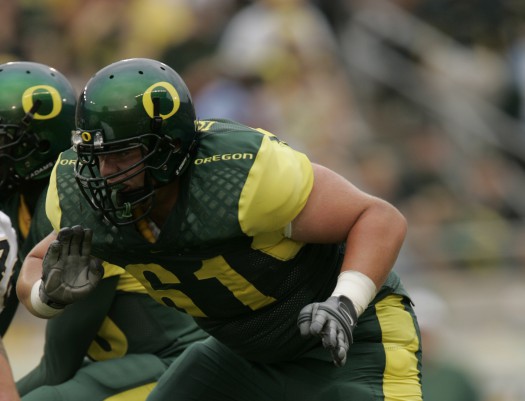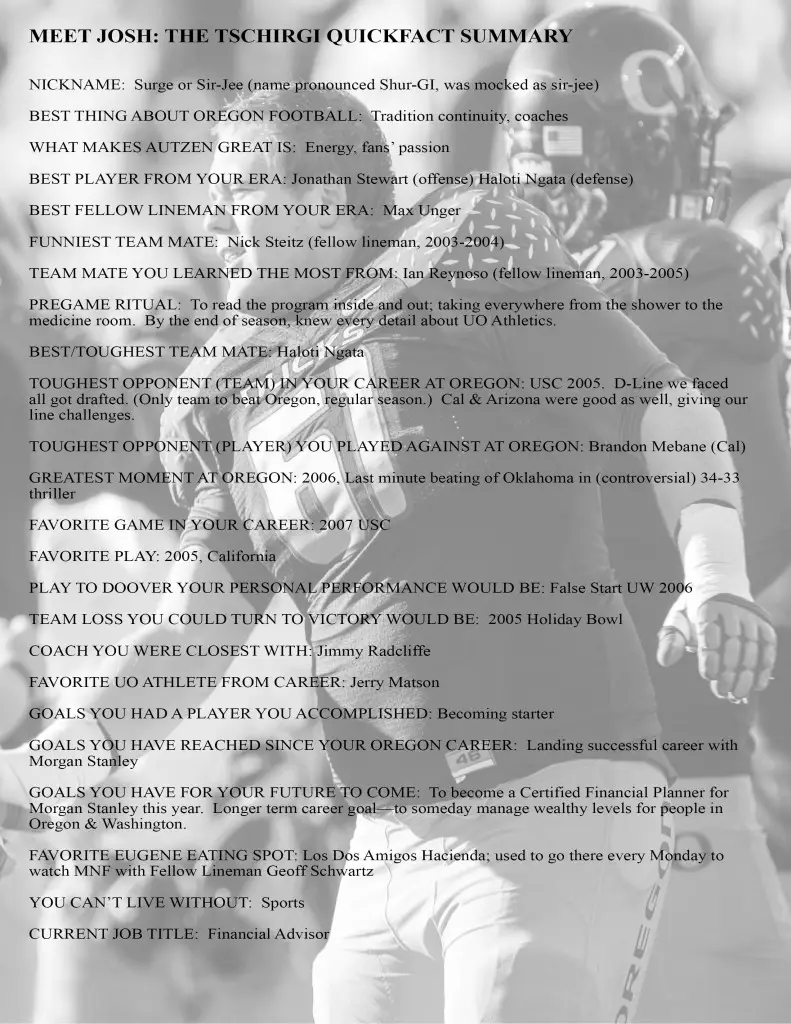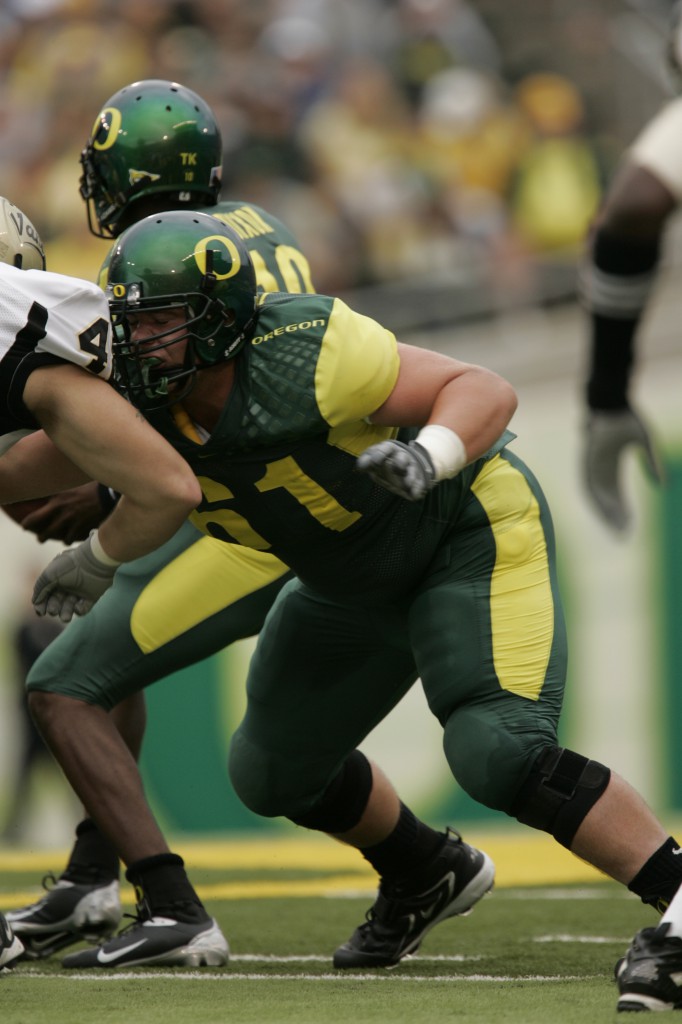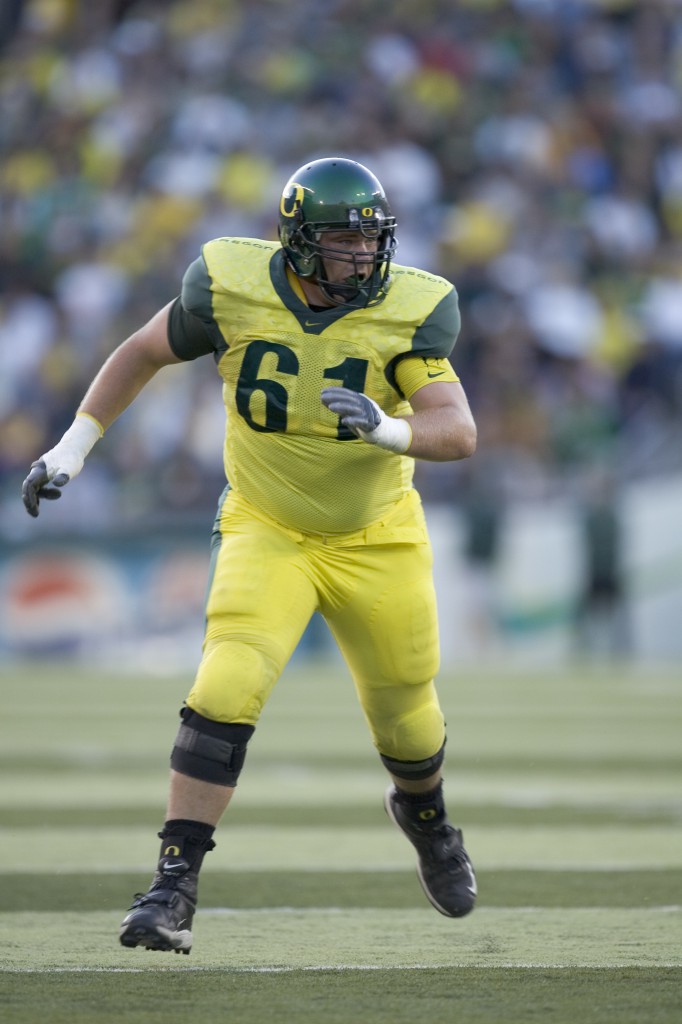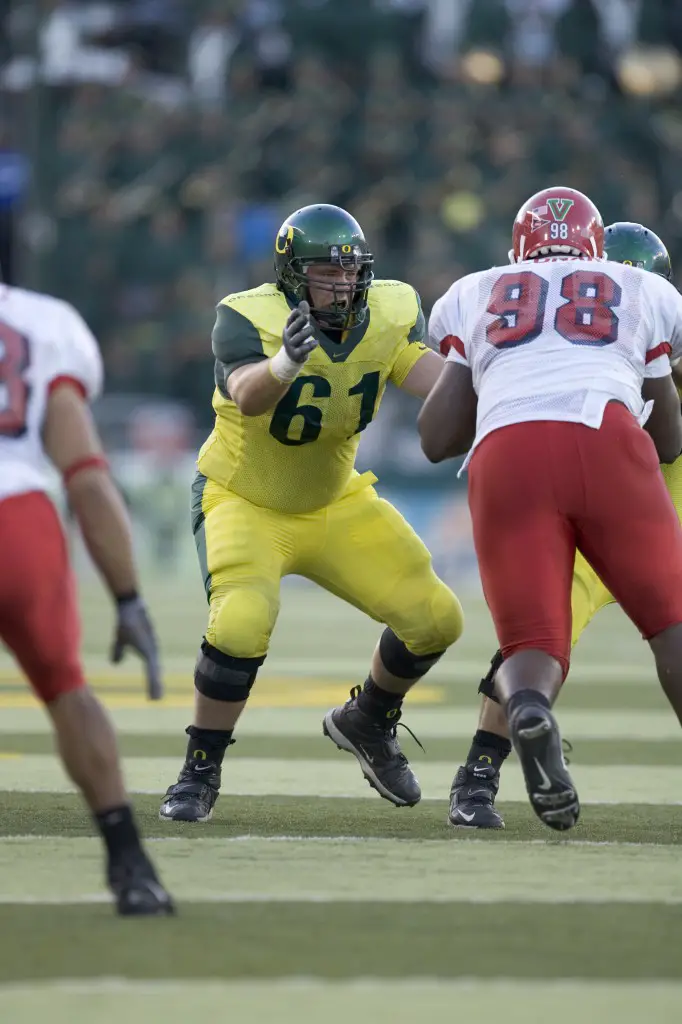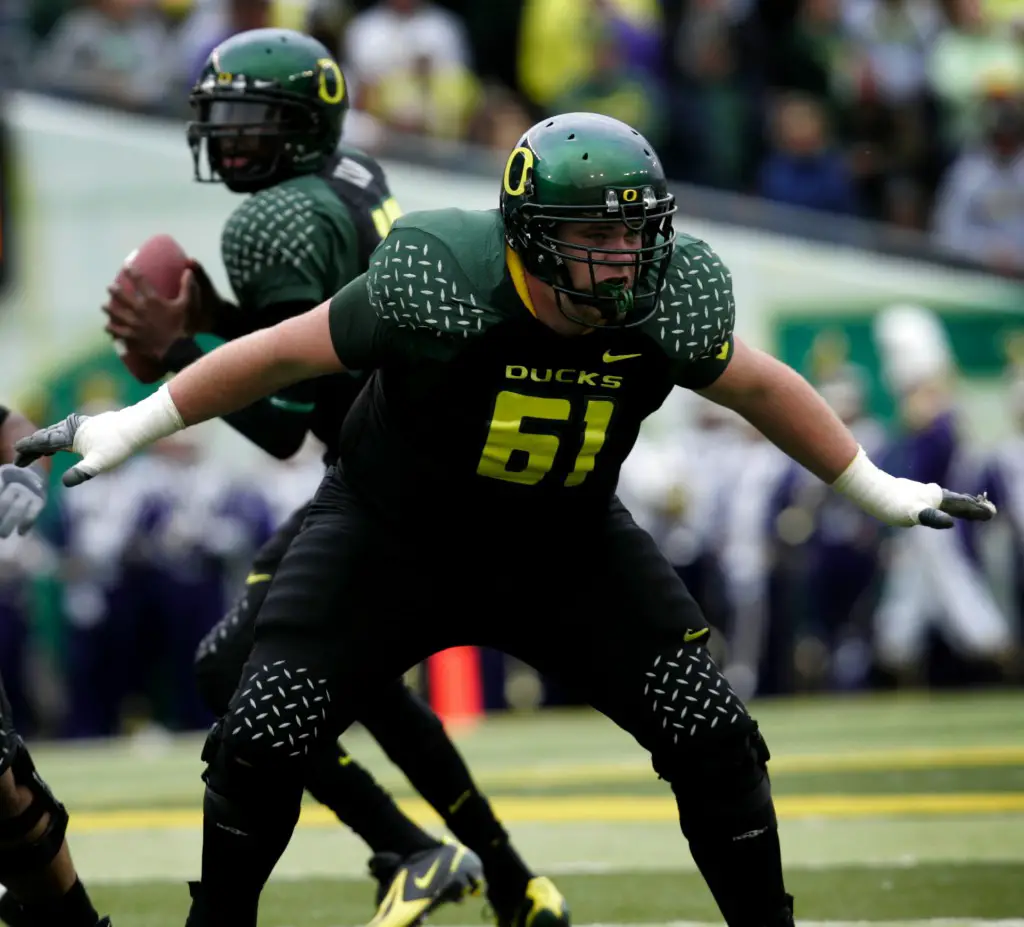In football, a strong and fast offensive line is key to a team’s success. The entire front must be strong enough to block for the backs, creating running room and giving the quarterback enough time to think. Especially in Oregon’s renowned spread offense, where it’s a physically daunting task, and easily taken for granted by many fans. All too often, spectators forget to notice that the only reason the speedsters and quarterbacks have the capacity to showcase their talents (with 11 fast and strong defenders charging toward them) is because of the guys up front doing all the heavy lifting. It all starts there on the O-line, and these are the hardest workers on the team: the highly under-rated — for all of their efforts – yet they’re only noted when flagged or missing a key block.
As a FishDuck contributor, I am pleased to take this opportunity to thank every offensive lineman who has  ever dressed in an Oregon Duck uniform, as your hard work is why Oregon’s offenses have thrived throughout the years. One lineman in particular made a special difference on the front line during his tenure as a Duck, as he worked hard to come in for the traditional pro-style multiple offensive scheme, and was there for the famous 2005 switch to the spread, where he finished his career in style. This lineman’s successful blocking paved ways for big names such as Kellen Clemens, Jonathan Stewart, and even Dennis Dixon. Without further ado, please welcome 2003-2007 Offensive Guard, Josh Tschirgi.
ever dressed in an Oregon Duck uniform, as your hard work is why Oregon’s offenses have thrived throughout the years. One lineman in particular made a special difference on the front line during his tenure as a Duck, as he worked hard to come in for the traditional pro-style multiple offensive scheme, and was there for the famous 2005 switch to the spread, where he finished his career in style. This lineman’s successful blocking paved ways for big names such as Kellen Clemens, Jonathan Stewart, and even Dennis Dixon. Without further ado, please welcome 2003-2007 Offensive Guard, Josh Tschirgi.
Q. WHAT SCHOOLS WERE RECRUITING YOU, AND WHAT MADE YOU DECIDE TO BE A DUCK?
A. Oregon, Washington State, Washington, Stanford, Portland State, and Montana. Oregon came to me super early in the process; started recruiting me as a sophomore. That courting process took about 18 months; and they offered me a spot into my senior year of high school. The camaraderie, community of people, healthy atmosphere, etc., played the biggest key in choosing Oregon.
EARLY DAYS AT OREGON
Josh Tschirgi came to Eugene, Oregon, as a neighbor from the north. The Vancouver, Washington, native was ranked in the top-20 prep offensive linemen by PacWest Football. Tschirgi would redshirt the 2003 season — his first year out of high school, and at the same time became an immediate asset on the scout team.
In only the first week, he earned ‘scout team player of the week’ honors in preparation for the season opener against Mississippi State. The 2003 season passed, and with two veteran linemen graduating, which left room for Tschirgi to fit in to the OL rotation the following year as a redshirt freshman.
The 2004 season featured an all-upperclassmen starting line, yet Tschirgi managed to see playing time in seven games on 42 snaps. His first came at Oklahoma in a road defeat, but came home the following week to help beat Idaho and later in the season Arizona. 2004 ended as one of the most disappointing years at Oregon; bad for the seniors, but good for younger players like Tschirgi to learn from and only improve upon.
MID-CAREER/2005 SWITCH TO SPREAD
Despite upperclassmen at the line in 2004, Oregon greatly struggled by giving up the most sacks in the Pac-10 and crumbling to the ground to allow Oregon’s only losing season in the last 20 years. The once-powerful offensive scheme was failing. Four out of five linemen graduated, leaving it the responsibility of the young players to pick up the pace at the line and get the Ducks back on track. On top of that, a major change took place to the traditional offensive set for Oregon. Then-Coach Mike Bellotti opted to end the Multiple/Pro-Style “West-Coast Offense” that he himself brought to Oregon 16 years prior (when hired as offensive coordinator.) The “pocket-passer” quarterback scheme was scrapped, and the line would be forced to learn everything all over again as the spread offense was introduced.
Many wondered about Oregon’s chances for success with the spread offense, and how long it would take to adjust. Only one starting offensive lineman returned, and it was up to the reserves like Tschirgi to quickly learn the new scheme. Not only would Tschirgi and company learn the system, but would show true pride and passion towards the unique new approach. Tschirgi got his first start at left guard as a redshirt sophomore in the first game at Houston, thriving in his debut by paving way for a dominant ground attack. Oregon even upset heavily favored Arizona State on the road, where Tschirgi took part in 76 snaps. In a tight Holiday Bowl against Oklahoma, he took part in 68 snaps to complete a miracle turnaround year, going from a 5-6 regular season to 10-1. The line also made a complete “180,” going from allowing the most QB sacks in 2004 to the fewest in 2005.
Q. FROM AN OFFENSIVE LINEMAN’S POINT OF VIEW, WHAT WAS IT LIKE TO SWITCH TO THE SPREAD OFFENSE? BETTER OR WORSE?
A. “Better. The spread is wonderful because you can see everything. Not so much the guards, but the tackles; you’ll run into a few types of defensive fronts. There’s only so many ways they can align their five or six defenders in the box. It gave us a huge advantage, as having one back and one tight end; or one back and no tight ends make it so the opposing defense has only so many ways they can line up against us (with only five, six, or seven players.) The basic premise of the spread and why we were successful, is that when you take the fullback and one tight end out, subbing with receivers 3-4 at any given time, taking out of the backfield and out wide requires defenses to go out and cover them. That makes it easier for the offensive line to know who’s in the box. With the old offense (when you have two backs, two tight ends,) all of a sudden there’s an eight-nine man front – allowing a safety to get involved in coverage. There are 20-30 variations of opposing defenses. All sorts of formations can be run, and when you’re a guard with your hand on the ground at the snap and short like me with a turtle neck and short arms – you can’t really see much! You’re trying to figure out all sorts of defensive alignments. In the spread, that goes away. It’s pretty much even or odd; their formation either 4-3, 3-3, 3-2, etc., – there’s only so many things they can do. You can spend a lot more time working on execution. In traditional two-back football, you spend lots of time trying to identify/measure what defensive player/position to block. It’s very easy in the spread to identify who to block, and that helped a lot. Once you take people out of the defensive box, coaches don’t have to spend all day teaching their defense, and offensive linemen can better identify defenders, as there are fewer of them. It’s ultra simple.”
“I was one of the guys who played under the old Bellotti offense with two-backs. Not kidding–the amount of time spent on coaching us on the linebackers was unbelievable. The spread can redirect that time into individual work and sharpening skills, opposed to trying to figure out who to block. Opposing coaches put in an extra d-back, and at least one linebacker is locked out against the spread. Bottom line, when you take out the FB and put in a slot receiver, it’s a lot easier to see when they’ll blitz, because they’ll have a longer way to go to make it happen.”
2006-2007, LIFE AS AN UPPERCLASSMAN VETERAN LINEMAN:
As a junior in 2006, Tschirgi was an 11 game starter at left guard, seeing 70+ snaps in seven games. Though the 2006 team started strong but had a rocky finish, the offensive stats were still solid, as the line finished with the second fewest sacks allowed in the conference. Tschirgi and the line also helped pave way for the success of Jonathan Stewart and Jeremiah Johnson (as well as Dixon) to lead the conference in rushing for the first time since 1955, and be ranked 14th nationally. Oregon had a rough finish to Tshirgi’s junior season, when things suddenly turned around in the spring with the introduction of Offensive Coordinator Chip Kelly.
“The big difference between Chip and the other coaches I saw go through there: Chip sold his vision and the players bought it. It was a good thing, as players bought into what he preached/coached, and his vision for the program. Lots of programs have goals; you’ll see team goals elsewhere. Chip sold a vision–which is in my opinion much stronger. Most of the players took to that lights out. Chip’s an inspirational type of coach without the ‘cheesy factor’ and he was able to convey what to get across. You learn from guys like that how important communication is between coaches and players.”
 2007 was a magnificent season for Oregon. The Ducks were on track from the start, and firing on all cylinders by wearing other teams down. The storied Michigan Wolverines had no answer for Oregon in the big house, losing 39-7 to the fast-paced Ducks. Oregon, led by Dennis Dixon, continually wore down one team after another, which never could have been done without the fast-paced Offensive Line with Tschirgi as a senior leader. One injury after another occurred, but Oregon would rally strong with backups stepping in. Going into November, Oregon was a front runner for the national title, as well as Dennis Dixon for the Heisman Trophy. Tragically, as every Duck remembers, both were cut just short with a late-season knee injury to Dixon. However, the team was strong the entire time, and the line never relinquished its power. Tschirgi started each game, and maintained the “blue-collar” attitude to grab whatever task was thrown his way. The Ducks finished strong with a Sun Bowl victory, sending Tschirgi out in style.
2007 was a magnificent season for Oregon. The Ducks were on track from the start, and firing on all cylinders by wearing other teams down. The storied Michigan Wolverines had no answer for Oregon in the big house, losing 39-7 to the fast-paced Ducks. Oregon, led by Dennis Dixon, continually wore down one team after another, which never could have been done without the fast-paced Offensive Line with Tschirgi as a senior leader. One injury after another occurred, but Oregon would rally strong with backups stepping in. Going into November, Oregon was a front runner for the national title, as well as Dennis Dixon for the Heisman Trophy. Tragically, as every Duck remembers, both were cut just short with a late-season knee injury to Dixon. However, the team was strong the entire time, and the line never relinquished its power. Tschirgi started each game, and maintained the “blue-collar” attitude to grab whatever task was thrown his way. The Ducks finished strong with a Sun Bowl victory, sending Tschirgi out in style.
TSCHIRGI COMMENTARY:
“The biggest difference in what Oregon does versus other programs: they run their program professionally. Anything from the coaching to athletic administration, it’s all business at Oregon. I think that’s the reason they’re successful, as it’s either they’re getting guys and letting people know early on that they’ve got to produce or they’ll find someone that will. But, I think that the seriousness the staff takes is probably one of the things that led to their success. That’s the mindset I saw that runs there.”
Q. WHAT DID YOUR POSITION COACH TEACH YOU THAT STICKS OUT THE MOST? DO YOU HAVE ANY SPECIFIC STORIES ABOUT THAT COACH?
A. “When I first got there, we were playing for a veteran O-line coach for years at Oregon. He was about man blocking schemes and a complicated running game. You’d see all sorts of different fronts for defenses, hard to understand. When Greatwood was switched to line coach, Greatwood was a zone guy, and he taught us zone blocking. For me, being smaller on a big line, zone blocking was that great equalizer where I could come off the football, know the guy beside me would come off the football, and I could come off really hard and my center/backside tackle would be there. Zone was a great equalizer; blocking allowed me to come off harder. I liked playing for Greatwood; he was a fantastic technical coach, probably the best in the business.”
POST-OREGON CAREER:
Following his graduation from University of Oregon, Josh Tschirgi pursued higher education studies, spending two years in graduate school in his home state of Washington. In 2011, a friend’s father offered him a starting position at Morgan Stanley in Portland.
“My buddy’s dad was a top adviser at Morgan Stanley. He introduced me to the business, he offered me a job to start right away and get my foot in the door. I had a one year trial period for them to see how hard I’d work and what I could do. I worked my butt off, worked my way up, and now just cruising.”
WHERE ARE THEY NOW:
Josh Tschirgi, 28, is a successful University of Oregon graduate; successfully employed by the renowned investment company Morgan Stanley as a financial adviser in downtown Portland. He hopes to eventually work with large accounts, currently pursuing post-gradutate studies to become a Certified Financial Planner and promote his career. Aside from work, Tschirgi bought a home in Portland where he lives with his girlfriend Heather and her daughter Faith. Already having accomplished so much more than many do prior to age 30, Tschirgi’s leadership and strife for success speaks for itself. The leadership he learned on and off field at Oregon shows today in his professional and personal life.
FINAL MESSAGE TO FANS FROM JOSH:
Appreciate the era of Duck Football we’re playing in now. Every now and then, we need to appreciate the blood sweat and tears former players put in to get the Ducks were they stand today. Don’t be upset – 11-2 season is great; it’s unprecedented to go to four BCS straight games. It’s good to appreciate how successful the program truly is. Thanks for all the support; I look forward to seeing everybody in the stands/parking lot and enjoying the same thing as a fan.
These are articles where the writer left and for some reason did not want his/her name on it any longer or went sideways of our rules–so we assigned it to “staff.” We are grateful to all the writers who contributed to the site through these articles.

